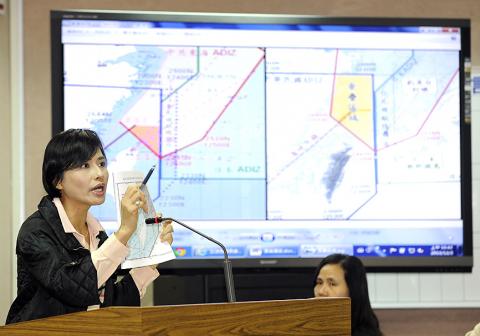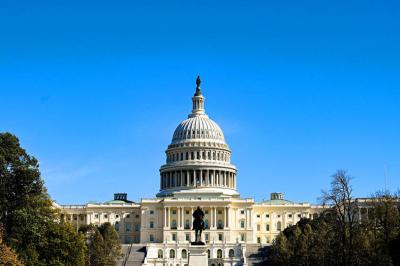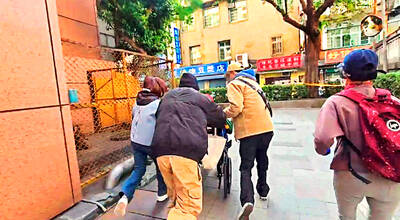The Legislative Yuan’s Foreign Affairs and National Defense Committee yesterday passed a motion chastising National Security Council (NSC) Secretary-General Jason Yuan (袁健生) for being absent from a committee meeting specifically held to address the government’s assessment of the situation following China’s unilateral declaration of an air defense identification zone (ADIZ).
Among the officials invited by the legislative committee were Yuan, Minister of National Defense Yen Ming (嚴明), National Security Bureau Director Tsai Der-sheng (蔡得勝), Minister of Foreign Affairs David Lin (林永樂), Deputy Minister of Transportation and Communications Chen Chun-ching (陳純淨) and Mainland Affairs Council Deputy Minister Chang Hsien-yao (張顯耀).
However, Yuan did not accede to the committee’s repeated requests to attend the meeting to report on the government’s stance and policies with regard to Beijing’s move to create the zone.

Photo: Chen Chih-chu, Taipei Times
The NSC is the main government unit that makes policies and decides on the responses to such issues, said committee convener Democratic Progressive Party (DPP) Legislator Chiu Yi-ying (邱議瑩), explaining why Yuan was summoned.
That the NSB secretary-general, who by rights should report to the legislature on all issues of national security and whose bureau is responsible for the government’s policy concerning the ADIZ, should be missing from such a crucial meeting was incredible, Chiu said.
In a vote, the committee later passed a motion condemning Yuan for his failure to attend the hearing.
At the meeting, DPP Legislator Tsai Huang-liang (蔡煌瑯) said the inaction of the administration of President Ma Ying-jeou (馬英九) when China was practically knocking at the nation’s door was only encouraging Beijing’s belligerence.
“Yuan [thinks he] is sly, but the committee is willing to give Yuan more time; it only takes five minutes to get to the Legislative Yuan from the NSC,” Tsai said before the vote was passed, adding that by refusing to attend the meeting Yuan was evidently trying to avoid his responsibility.
DPP Legislator Mark Chen (陳唐山), who has previously served as foreign minister, said that though there is a precedent for the NSC head being absent from the legislature, the establishment of the air zone should be considered an incident of grave importance and Yuan should have attended the meeting.
“Yuan must make a report to the legislature on this matter,” Chen said. “Only by doing so can the Ma administration show that it is being a responsible government.”
Meanwhile, DPP Legislator Chen Ou-po (陳歐珀) criticized the myriad stances of the officials in Ma’s Cabinet.
“At best, they only dare to say they regret China’s decision, but they have not expressed their opposition,” Chen Ou-po said.
Chen Ou-po then asked all five of the invited officials to “please raise your hand if you feel that China’s establishment of the ADIZ in the East China Sea is an unfriendly gesture.”
Yen, Tsai and Chen Chun-ching raised their hands, while Lin and Chang did not.
When pressed to make clear their stance on the issue, Yen said that China’s action was an “unfriendly” move and that although part of China’s air defense zone overlaps with Taiwan’s, Beijing “did not consult us beforehand.”
Lin said repeatedly that Taiwan has already expressed its stance on the issue, while Chang said the council has expressed its opinions to China’s Taiwan Affairs Office through the proper channels.

Taiwan must first strengthen its own national defense to deter a potential invasion by China as cross-strait tensions continue to rise, multiple European lawmakers said on Friday. In a media interview in Taipei marking the conclusion of an eight-member European parliamentary delegation’s six-day visit to Taiwan, the lawmakers urged Taipei to remain vigilant and increase defense spending. “All those who claim they want to protect you actually want to conquer you,” Ukrainian lawmaker Serhii Soboliev said when asked what lessons Taiwan could draw from Russia’s invasion of Ukraine. Soboliev described the Kremlin as a “new fascist Nazi regime” that justified

The US House of Representatives yesterday passed the PROTECT Taiwan Act, which stipulates that Washington would exclude China from participating in major global financial organizations if its actions directly threaten Taiwan’s security. The bill, proposed by Republican US Representative Frank Lucas, passed with 395 votes in favor and two against. It stipulates that if China’s actions pose any threat to Taiwan’s security, economic or social systems, the US would, “to the maximum extent practicable,” exclude China from international financial institutions, including the G20, the Bank for International Settlements and the Financial Stability Board. The bill makes it clear that China

‘T-DOME’: IBCS would increase Taiwan’s defense capabilities, enabling air defense units to use data from any sensor system and cut reaction time, a defense official said A defense official yesterday said that a purported new arms sale the US is assembling for Taiwan likely includes Integrated Battle Command Systems (IBCS). The anonymous official’s comments came hours after the Financial Times (FT) reported that Washington is preparing a US$20 billion arms sale encompassing “Patriot missiles and other weapons,” citing eight sources. The Taiwanese official said the IBCS is an advanced command and control system that would play a key role in President William Lai’s (賴清德) flagship defense program, the “T-Dome,” an integrated air defense network to counter ballistic missiles and other threats. The IBCS would increase Taiwan’s

NOMINAL NEWLYWEDS: A man’s family and his wife — his long-term caregiver — are engaged in a legal dogfight over the propriety and validity of the recent union A centenarian’s marriage to his caregiver unbeknownst to his children has prompted legal action, as the caregiver accuses the man’s children of violating her personal liberty and damaging her reputation, while the children have sought a legal option to have the marriage annulled. According to sources, the 102-year-old man surnamed Wang (王) lives in Taipei’s Zhongshan District (中山) and previously worked as a land registration agent. Wang reportedly owns multiple properties and parcels of land worth several hundred million New Taiwan dollars and has ten children. His caregiver, a 69-year-old surnamed Lai (賴), has been caring for him since about 1999,